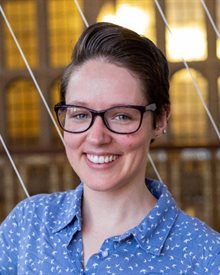Holly Foss

I’m a Senior Lecturer in Railway Systems Education in the School of Engineering and Director of Education for Birmingham Centre for Railway Research and Education, which keeps me pretty busy! I identify as Queer and I’ve been a Rainbow Network member for several years, and I also get involved in oSTEM whenever possible. In my role I work on designing and developing education, and within this I focus on inclusion and concepts like queer pedagogy and decolonising the curriculum.
In an ideal world, I think that UoB Staff LGBTQ+ profiles wouldn’t be necessary, but at the moment, anything that raises visibility or awareness of the LGBTQ+ community, and contributes to a sense of community and identity-building is useful. Within the LGBTQ+ community it’s really positive to have role models, which those newer to the community or more junior in their careers can look up to, and see that all sorts of different people can thrive while being LGBTQ+. They’re useful beyond the community too, for those who aren’t LGBTQ+ to increase understanding and inclusion. I once had somebody say to me “Oh, I’ve never met one before!”, which was frustrating, so it’s a positive thing for all people to be able to see that diverse individuals are part of their everyday lives.
I find the concept of “coming out at work” a bit odd, since it’s not a one-off thing but rather a constant negotiation. I’ve not explicitly done a big announcement, but I make sure to mention my wife and the queer community as a way to build representation and challenge assumptions. There are some situations where even idealistically, revealing your orientation or gender identity isn’t appropriate, because you’re going to put yourself in danger; I’ve been reasonably lucky, I’ve never felt at risk from saying “my wife”. Nobody should feel obligated to come out or not, but I think that’s also the reason it’s important to do so if possible. Because of heteronormativity and gender-normativity, any action that promotes visibility is useful, and it is really great that people do. I also recognize that being or feeling like a ‘token’ can be difficult and can take its toll. Ideally people should be in a position where they can do so, but also can step back from being that person. That’s why visibility is so important – it makes it more and more possible that there won’t just be one person that people look to and that we can celebrate and usualise diversity.
Overall, I’d say that the University is LGBTQ+ friendly: there are role models at different levels of the institution, there’s the Rainbow Network, different visibility initiatives, lighting up Old Joe, and events for LGBTQ+ History Month or Transgender Day of Remembrance, as well as Ally training. All of this is so important in representing diversity and building inclusion.
My message to new LGBTQ+ members of staff or students joining UoB would be that this is a big University and there’s always people you will share things with, so you never need to feel alone or isolated. And I hope that all people can feel comfortable in their own identity here.